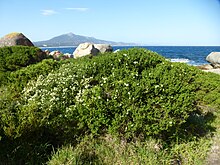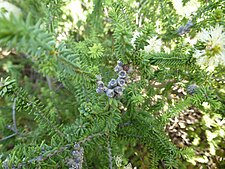| Melaleuca microphylla | |
|---|---|

| |
| Melaleuca microphylla growing at Bettys Beach near Albany | |
| Scientific classification | |
| Kingdom: | Plantae |
| Clade: | Tracheophytes |
| Clade: | Angiosperms |
| Clade: | Eudicots |
| Clade: | Rosids |
| Order: | Myrtales |
| Family: | Myrtaceae |
| Genus: | Melaleuca |
| Species: | M. microphylla |
| Binomial name | |
| Melaleuca microphylla Sm. | |
| Synonyms | |
Melaleuca microphylla is a plant in the myrtle family, Myrtaceae and is endemic to a small area in the south-west of Western Australia. It is a bushy shrub with small, crowded leaves and bears a close resemblance to the commonly cultivated Melaleuca ericifolia of the eastern states.
Description
Melaleuca microphylla is a dense, rounded shrub growing to about 4–5 m (10–20 ft) high with glabrous foliage and grey or white papery bark. The leaves are arranged alternately, 3–8 mm (0.1–0.3 in) long, 0.3–0.5 mm (0.01–0.02 in) wide, linear to narrow lance-shaped and with a blunt or slightly pointed end.
The flowers are white to creamy yellow and are arranged in small heads on the ends of the branches which continue to grow after flowering. The heads are up to 50 mm (2 in) long, 22 mm (0.9 in) in diameter and contain between 10 and 50 individual flowers. The petals are 1.0–2.2 mm (0.04–0.09 in) long and fall off as the flower matures. The stamens are arranged in five bundles around the flowers with 4 to 10 stamens in each bundle. The main flowering season is spring and is followed by fruit which are woody, cup-shaped capsules, 2–3 mm (0.08–0.1 in) long and 3–4 mm (0.1–0.2 in) in diameter, arranged in loose clusters along the stem.



Taxonomy and naming
This species was first formally described in 1812 by James Edward Smith in The Cyclopedia from a specimen "gathered near King George's Sound, on the West Coast of New Holland, by Mr. A. Menzies". The specific epithet (microphylla) is from the Ancient Greek words mikros meaning little and phyllon meaning "leaf" referring to the small leaves of this melaleuca.
Distribution and habitat
Melaleuca microphylla occurs in and between the Manjimup and Manypeaks districts in the Esperance Plains, Jarrah Forest, Mallee, Swan Coastal Plain and Warren biogeographic regions. It grows in sandy clay near swamps and creeks.
Conservation
Melaleuca micromera is listed as "not threatened" by the Government of Western Australia Department of Parks and Wildlife.
Uses
Horticulture
This species is often used as a hedge or screen, growing successfully in most soils and situations.
Essential oils
The oil from the leaves of this species consists mainly of monoterpenes.
References
- ^ "Melaleuca microphylla". Plants of the World Online. Retrieved 2 September 2021.
- ^ Brophy, Joseph J.; Craven, Lyndley A.; Doran, John C. (2013). Melaleucas : their botany, essential oils and uses. Canberra: Australian Centre for International Agricultural Research. p. 243. ISBN 9781922137517.
- ^ Holliday, Ivan (2004). Melaleucas : a field and garden guide (2nd ed.). Frenchs Forest, N.S.W.: Reed New Holland Publishers. pp. 188–189. ISBN 1876334983.
- "Melaleuca microphylla". APNI. Retrieved 11 April 2015.
- Rees, Abraham (ed).; Smith, James Edward (1812). The Cyclopædia; or, Universal Dictionary of Arts, Sciences, and Literature Volume 24. Philadelphia: Samuel F. Bradford. hdl:2027/njp.32101078163480. Retrieved 11 April 2015.
- ^ Brown, Roland Wilbur (1956). The Composition of Scientific Words. Washington, D.C.: Smithsonian Institution Press.
- ^ "Melaleuca microphylla". FloraBase. Western Australian Government Department of Biodiversity, Conservation and Attractions.
- Paczkowska, Grazyna; Chapman, Alex R. (2000). The Western Australian flora : a descriptive catalogue. Perth: Wildflower Society of Western Australia. p. 395. ISBN 0646402439.
- Wrigley, John W.; Fagg, Murray (1983). Australian native plants; a manual for their propagation, cultivation and use in landscaping (2 ed.). Sydney: Collins. p. 266. ISBN 0002165759.